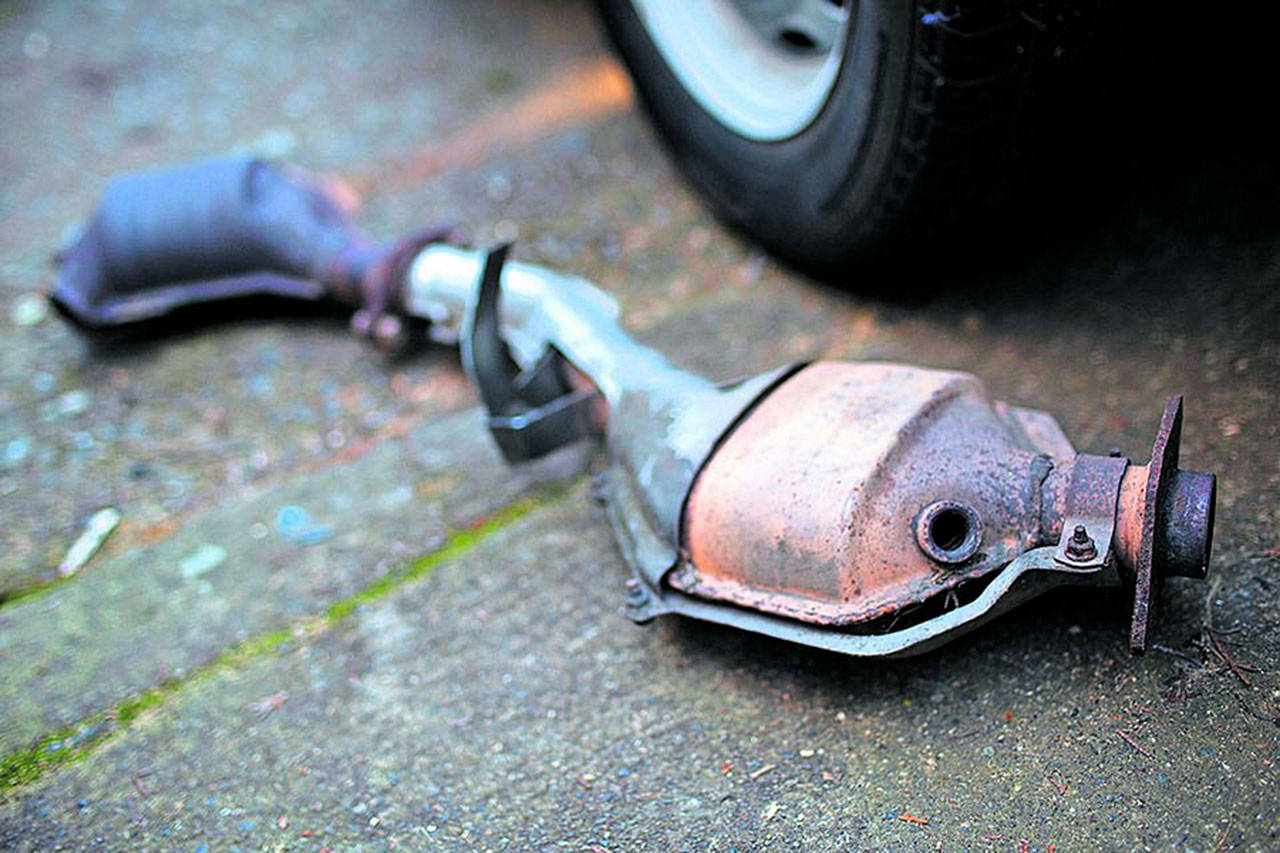SNOHOMISH — Amanda Sullivan is a light sleeper.
So she woke up when her husband, who had to commute to Seattle early in the morning, started his Toyota Tacoma outside their Snohomish home on June 9 and it “sounded like a jackhammer.”
That was because it was missing its catalytic converter, an anti-pollution device on the underside of the truck. It was apparently stolen overnight. The truck’s leveling kit, raising the front of the vehicle to bring it more even with the back, may have made for easier access for the thief, Sullivan figured.
The device cost them $900 to replace days later.
“It was really kind of disheartening,” Sullivan said. “I didn’t think it would affect us, and one morning it did.”
Catalytic converter thefts have risen across the region in the past year as prices for the precious metals inside — namely palladium, rhodium and platinum — have skyrocketed. Thieves can slide under vehicles and in a matter of minutes walk away with a device worth a few hundred dollars in metals that can be sold to scrap metal recyclers. At one point earlier this year, rhodium was worth nearly $30,000 per ounce. Catalytic converters contain a small fraction of that.
“When the metal prices were low and that wasn’t very viable, I mean, you didn’t really have any catalytic converter theft going on,” Mukilteo police Sgt. Colt Davis said.
State law requires dealers to produce records of every transaction they make, including the ID of the seller and the type of car used to deliver the metal. But whether that always happens is an open question, said Monroe police Cmdr. Paul Ryan.
“It’s one thing to have a rule in place, it’s another thing to follow it,” Ryan said.
The National Insurance Crime Bureau tracked 282 catalytic converter thefts per month on average in 2019. That number leaped to over 1,200 per month last year.
In Everett, 128 thefts were reported from the beginning of the year to June 14, said Everett police officer Kerby Duncan. The reports have only risen throughout the year: eight in January, 28 in May, 35 in the first half of June. Before this year, Everett police weren’t even tracking catalytic converter thefts individually. Instead, they folded them into the umbrella of motor vehicle thefts, but this year’s spike has made a separate category necessary.
“It’s been becoming a pretty big issue in the whole Puget Sound area and we’re not immune to that,” Duncan said.
In Bothell, catalytic converters were stolen from 81 vehicles between Jan. 1 and July 6, Bothell Police Department spokesperson Cam Johnson said in an email.
Since last June, Monroe has seen 32 catalytic converters stolen as of July 7, Ryan said.
Both Ryan and Davis said the devices have seemingly been more likely to be stolen in commercial areas, where thieves are unlikely to get caught in the middle of the night.
A Duvall man was at work in Monroe in the early morning hours of July 7 when he heard the sound of a saw. He walked outside the business and found a man holding three catalytic converters in his hand, including the one from the Duvall man’s truck, according to a police report. He dropped one of the devices on the ground and said something like, “This one is yours,” the Duvall man told police.
The man reportedly got into truck and the woman driving it sped away. Monroe police have the suspects’ license plate but had not made any arrests as of last week.
The Duvall man reported he was going to weld the catalytic converter back into his truck.
Police haven’t had overwhelming success in catching suspects in catalytic converter heists. How many separate thieves are working in Snohomish County is largely unknown because many are likely striking multiple times. A couple arrests have been made in the past few weeks in Everett, however, Duncan said.
For example, an Everett man installed a “skid shield” over his catalytic converter that recently slowed suspects down. He confronted them as they attempted to saw it loose, so they ran away, but not before the man got a picture of their getaway car. This helped Everett police track a suspect to Seattle, where he was arrested for investigation of attempted second-degree theft of motor vehicle parts July 7. Within a day, the defendant posted $1,000 bond and was out of jail.
Since the catalytic converters cost more than $750 to replace, the thefts are considered class C felonies. Replacements can cost upwards of $2,000.
Nearly 800 catalytic converters were seized in Kent last month. Multiple suspects were arrested after traveling to King County from out of state, allegedly to purchase the stolen devices, according to Kent police.
Sullivan said she didn’t think anyone had been arrested in connection with the June 9 theft outside her house.
Now she’s worried it’ll happen again.
“It’s been a little unsettling,” Sullivan said. “If I hear something, I’m getting up and looking out the window now.”
What can you do to prevent catalytic converter theft?
• Police do not suggest stepping in if you see your catalytic converter being stolen. Instead, you should try to see what vehicle they leave in and write down the license plate number.
• Engrave the device with the VIN number to make it more easily traceable.
• If possible, park in well-lit areas or in a garage.
• Weld the catalytic converter to the vehicle’s frame or install an undercarriage to make it harder to access.
Jake Goldstein-Street: 425-339-3439; jake.goldstein-street@heraldnet.com. Twitter: @GoldsteinStreet.
Talk to us
> Give us your news tips.
> Send us a letter to the editor.
> More Herald contact information.

























